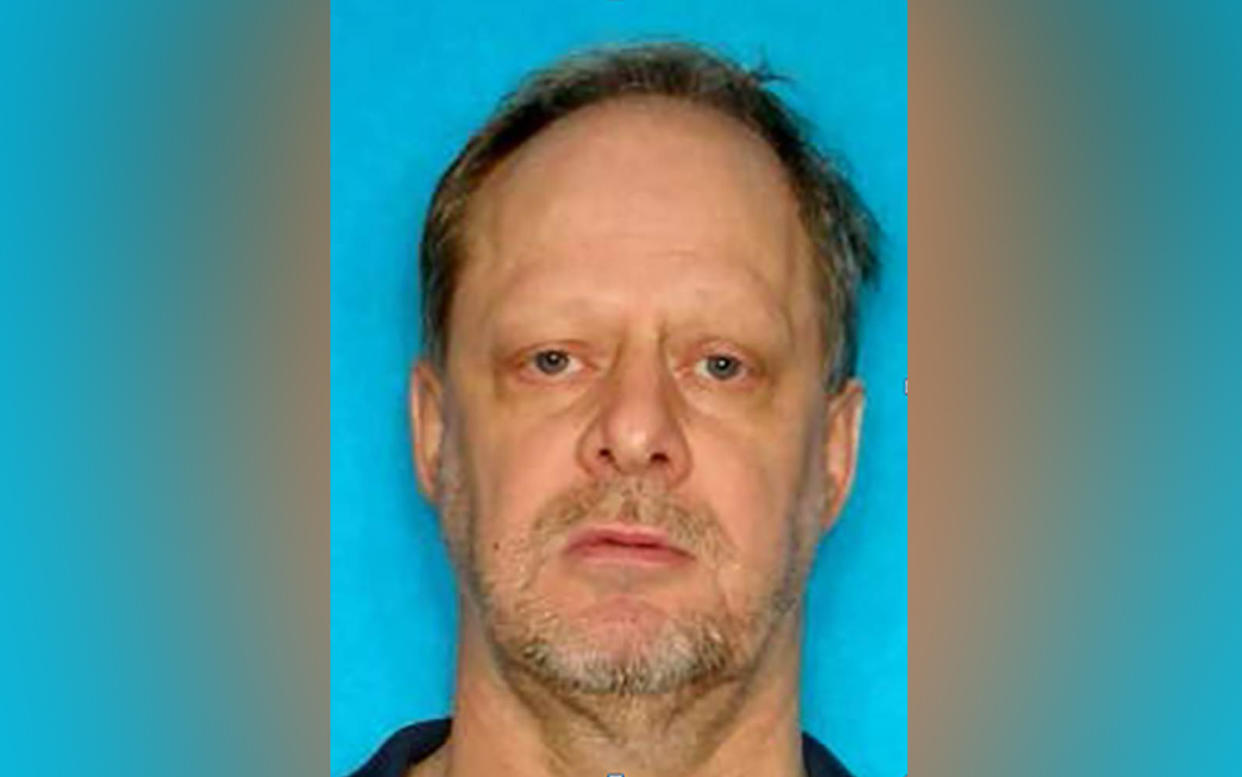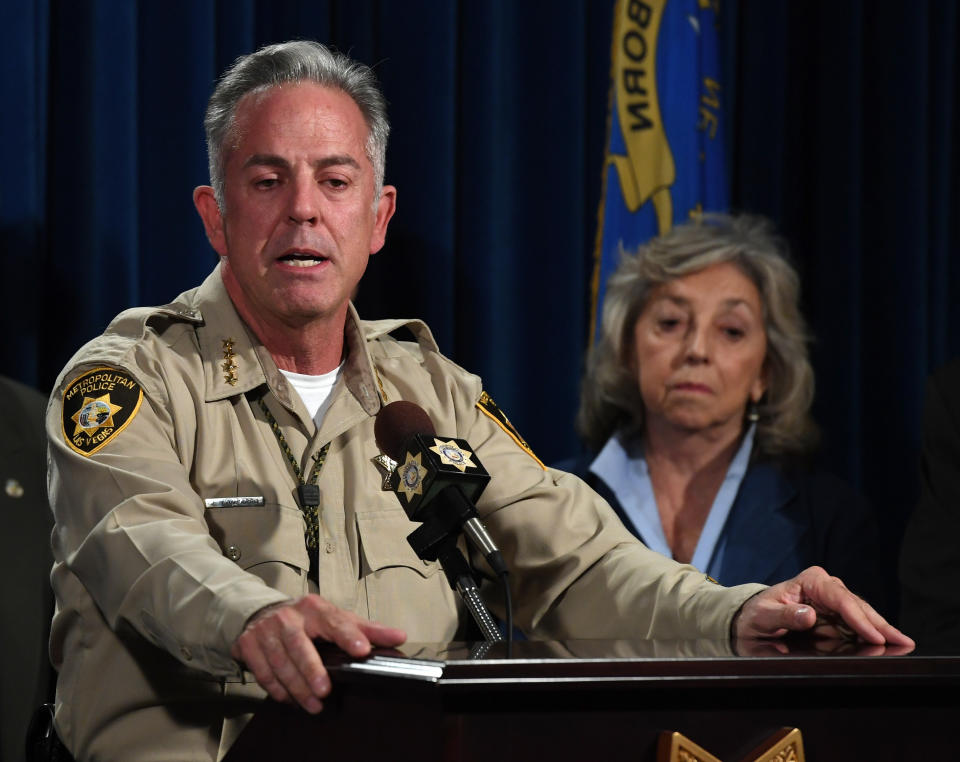Portrait of Las Vegas gunman: A narcissist on a losing streak

Police say the man who shot and killed 58 people and injured more than 540 others in last month’s deadly massacre in Las Vegas was a status-obsessed narcissist who had lost a “significant amount of wealth” in the last two years, something authorities now believe may have been a “determining factor” in the Oct. 1 attack.
In a wide-ranging interview with KLAS-TV, the local CBS affiliate, Las Vegas Sheriff Joe Lombardo said gunman Stephen Paddock was a successful real estate investor and prolific gambler whose wealth had fluctuated over the years. But, according to the sheriff, Paddock had been losing money since September 2015, triggering “bouts of depression.”
“This individual was status-driven, based on how he liked to be recognized in the casino environment and how he liked to be recognized by his friends and family. So obviously that was starting to decline in the short period of time, and that may have had a determining effect on why he did what he did,” Lombardo said. “He was going in the wrong direction.”
But Lombardo cautioned that investigators still have not settled on the precise reason for why Paddock suddenly unleashed a deadly barrage of bullets onto the crowd at the Route 91 Harvest music festival from the windows of his 32nd floor suite at the Mandalay Bay Resort and Casino a month ago. Lombardo, as he has repeatedly warned in recent weeks, again said Paddock’s motive may never truly be understood.

The sheriff characterized Paddock as “nondescript” and methodical in planning the attack and concealing his motives. He confirmed reports that a hard drive from one of the laptops found in the gunman’s hotel suite was missing and said histories recovered from Paddock’s other electronic devices had failed to yield clues about the gunman’s “trigger point.”
Though ISIS claimed credit for the attack, Lombardo said investigators had found no links between Paddock and any terrorist groups and no evidence he had been radicalized. Paddock also did not appear to have any strong political beliefs — though, according to the sheriff, he had recently told an associate that he was happy with Donald Trump’s presidency “because the stock market was doing well.” “That’s the only thing we’ve seen referencing politics,” Lombardo said.
While he suggested Paddock worked to conceal his plot, the sheriff continued to express doubts about the gunman’s friends and family who have insisted they had no inkling of his plans or dangerous state of mind. He specifically mentioned Marilou Danley, Paddock’s longtime girlfriend, and the gunman’s younger brother, Eric, suggesting the “attack could have been prevented on so many levels” had they or anyone reported “some modicum of information that would have presented this individual’s state of mind.”
Authorities are still interviewing Danley, who was visiting family in the Philippines at the time of the Oct. 1 rampage and who insisted she knew nothing of Paddock’s plans. She has been named a “person of interest” in the case, partly because Paddock reportedly wired her $100,000 in the days before the shooting. Through her attorney, Danley has said she thought the money was Paddock’s “way of breaking up with me.”
Lombardo said that while investigators for the most part accept Danley’s account, he continued to have doubts about her story, telling KLAS-TV, “Personally I find it hard to believe.”

Among other things, he pointed to Paddock’s arsenal of nearly 50 guns, including the 23 weapons found in his Mandalay Bay hotel room, most of which were purchased in the last year. “There is a lot of people that have hundreds and hundreds of guns, but for this individual to do it at a certain point in time and to do it all with such robust action, you would think that Ms. Danley would have some information associated with that,” Lombardo said. “But currently we haven’t been able to pull that out of her, if it’s in her.”
He also suggested that something seemed off about Paddock’s family, using the word “manic” to describe the gunman’s younger brother, Eric, in his dealings with the media in the aftermath of the shooting. “He continues to talk and continues to … dig a hole,” Lombardo said, though he did not elaborate further.
While Lombardo was trying to clarify Paddock’s behavior and motives, questions were still being asked about the police response to the shooting and the handling of the investigation. It remains unclear why it took officers 12 minutes after the shooting began to reach the 32nd floor, where the gunman’s suite was located, and why police waited for more than an hour to enter the room after the shooting had stopped. Several questions remain unanswered about what communication took place, if any, between police and hotel security.
Paddock had shot a security guard who approached his room, on an unrelated call, just before he began through a window. Jesus Campos, the wounded security guard, later told talk show host Ellen DeGeneres, in his only public interview, that he immediately radioed hotel security that he had been shot. But it’s still unclear exactly when Campos relayed that information to the hotel and how or if casino officials communicated that information to the police.
On Thursday, more than a dozen news organizations, including the Associated Press, Los Angeles Times, ABC News, CNN and the Las Vegas Review Journal, filed two lawsuits, one seeking access to audio of 911 calls, body camera video and other still undisclosed police records related to the shooting and the other seeking to unseal court papers related to search warrants connected to the investigation, including any served on Mandalay Bay.

The Las Vegas police have declined to comment on the lawsuits, but Lombardo used his interview, which was taped ahead of the court filings, to defend his department’s response and the employees at the casino as well. “I don’t want anyone perceiving that MGM and Mandalay Bay didn’t do their job,” he said. While he was not asked specifically about the casino’s actions on the night of the shooting, the sheriff defended Mandalay Bay against suggestions its employees failed to question Paddock about the arsenal of weapons he amassed in his suite.
Offering some new details, Lombardo said he believes Paddock may have carried the guns unnoticed, moving them upstairs in separate bags over several days starting on Sept. 25, the day he checked in.
“I wouldn’t say nobody saw him bringing bags into the hotel. People saw him, but ten to fifteen thousand people a day go through those doors … and was he doing it over a period of several days, which would not bring attention to him,” he said. “There was nothing that stuck out. They had experience with this individual. They knew him.”
Lombardo confirmed that Mandalay Bay had handed over hours of video taken around the casino and that police had so far viewed about “90 to 95 percent” of it. Despite reports that the shooter had been seen with a possible accomplice, and the fact that he ordered dinner for two from room service on the night of the attack, Paddock was alone at the time of the shooting, the sheriff said.
Though Campos and a hotel maintenance worker who had also arrived on the floor both radioed word of the shooting, police apparently didn’t identify where the shots hitting the concert area were coming from until roughly seven minutes after Paddock began shooting out the window. According to the timeline, police reached the 31st floor at 10:12 p.m., where officers reported that shots were coming from the floor above them. They finally reached the 32nd floor at 10:17 p.m. — two minutes after Paddock stopped shooting. Police did not breach Paddock’s room until 11:20 p.m. — over an hour later — when they found him dead of a self-inflicted gunshot wound.

Police originally said Campos interrupted the shooting, bringing the deadly rampage to a stop. But they later said Paddock stopped firing on his own. Police still have no clear answer for why Paddock stopped shooting. According to Lombardo, the gunman still had 4,000 rounds of ammunition left in his room when he killed himself. He also had tactical equipment in the room and a vehicle downstairs containing thousands of rounds of additional ammunition as well as explosives, all of which has led police to speculate he possibly intended to escape and unleash more violence elsewhere.
In the KLAS-TV interview, Lombardo theorized that Paddock may have believed that police were closing in. Investigators found the shooter had researched police response tactics while planning his massacre. “Maybe he felt like he accomplished what he wanted to accomplish. … He had to have been aware we were probably going to come in the door any minute,” Lombardo said.
But the sheriff acknowledged that it was one of the many questions that are likely to go unanswered in the investigation. With officials reaching dead ends in their search for a clear motive, Lombardo said he hoped something would turn up in the examination of the gunman’s brain by a laboratory at Stanford University — although scientists say it’s a long shot.

“I actually hope we find something in the pathology of his brain that will help us understand this,” Lombardo said. “I am as frustrated as anyone. … Why would this individual take it upon himself to cause the worst mass shooting in our lifetime? Without reason or cause? We haven’t gotten that answer yet.”
Read more from Yahoo News:
A surreal scene as Las Vegas returns to business after Sunday massacre
Now I Get It: Why haven’t authorities named Las Vegas gunman a terrorist?
Photos: The front page: How newspapers portrayed the Vegas massacre
Photos: Makeshift memorials pay tribute to Las Vegas shooting victims
Photos: Law enforcement continues to investigate Las Vegas mass shooting



